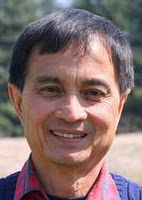Danger of new autocrats underestimated
The new autocrats’ priority is political control: A person prepared to acknowledge the ruling group’s supremacy and follow its directives is allowed a certain amount of autonomy to operate. “Loyalists are rewarded, enemies are punished, the neutral are neglected or casually abused,” says the report…
On Cambodia, Kurlantzick writes, “members of China’s Communist Party have advised Prime Minister Hun Sen’s party on how to use laws for libel and defamation to scare the independent media, create a network of senior officials who can control major companies, and instill loyalty in special police and bodyguard forces.”
PACIFIC DAILY NEWS
 Dec. 14, 2011
Dec. 14, 2011
Danger of new autocrats underestimated
A. Gaffar Peang-Meth
Two years ago, I presented in this space a June 2009 posting in Foreign Policy Online titled “Authoritarianism’s New Wave,” about a “new class of autocrats” and their “most serious challenge” to the rules of law, human rights, and open expression. The piece was jointly written by Jennifer Windsor, Jeffrey Gedmin and Libby Liu, of Freedom House, Radio Free Europe, and Radio Free Asia, respectively.
The three organizations also published a report, “Undermining Democracy: 21st Century Authoritarians,” on the strategies and methods of five countries — China, Iran, Pakistan, Russia and Venezuela — “to impede human rights and democratic development” within and beyond their borders.
The report asserted “advocates for freedom” — democrats in those countries — receive little attention and few resources from the democratic world because the systems that persecute them “are poorly understood” and that Western “policymakers do not appear to appreciate the dangers these 21st century models pose to democracy and rule of law around the world.”

The new wave
Windsor, Gedmin and Liu see the new autocrats and the traditional authoritarians as using the same tools to manipulate “the legal system, media control and outright fear” to stay in power.
Yet the new autocrats engage in something new and unique: “armies of commentators and provocateurs to distract and disrupt legitimate Internet discussions”; “updated, sophisticated, and lavishly funded” global media enterprises to shape international values and views; disruption of key international rules and rights-based organizations, including the United Nations. And the Chinese have emerged as the world’s largest lender, doling out billions of dollars of no-strings-attached foreign aid.
Also unique and new is what the new autocrats are not doing.
The new autocrats who “redefined and heavily distorted” the concept of democracy, stress their achievements and belittle what is Western, promote strong “nationalistic or extremist” views of history, and imprint in young people hostile attitudes toward democracy and suspicion of the outside world.
They seek to control Internet access “through physical, economic, and technological means,” and use “draconian laws” to punish outspoken online critics and discourage others from criticism.
While Russia, Iran and Venezuela use “oil wealth to … bankroll clients abroad,” China uses the “win-win (shuangying)” doctrine of foreign relationships and her “soft-power methods” to encourage Latin American, African, Asian and Arab states toward “mutually beneficial arrangements with China” through “no-strings-attached development aid.”
But it’s not how much money China gives or loans to others that’s significant. It’s that Chinese aid has become for dictators an alternative to Western aid, which demands “good governance.” The Chinese don’t care who the recipients of their aid are.
There are major differences among the five countries studied, but they share “important common traits” — each country is ruled by a “small in-group” using state power and national wealth to serve the group’s interests and ensure support of citizens. All five lack “built-in corrective measures” — “genuinely competitive elections, free media, independent civil society organizations, and the rule of law.”
This allows “repressive and arbitrary governance, and … entrenched, rampant corruption.”
The new autocrats realize that absolute control over information and economic activity is neither possible nor necessary. Instead, their contemporary methods include guiding and managing political discourse; selectively suppressing or reshaping news and information; squelching, co-opting or paralyzing important business entities; allowing ordinary Chinese and Russian citizens to travel freely to these authoritarian countries; and engaging in global trading and international commercial relationships.
The new autocrats’ priority is political control: A person prepared to acknowledge the ruling group’s supremacy and follow its directives is allowed a certain amount of autonomy to operate. “Loyalists are rewarded, enemies are punished, the neutral are neglected or casually abused,” says the report.
It concludes: “The strength and competitive advantage of democratic states lie in their rules-based, accountable, and open systems, and in the values and standards that support them. … It is therefore in the democracies’ interest to safeguard and promote the very qualities that set them apart from the authoritarians.”
China’s methods
Council on Foreign Relations fellow Joshua Kurlantzick’s “The long arm of China, A rising world power begins to intervene in outside governments” writes that China trains several thousand officials from surrounding countries yearly on strategies to keep the government in power.
On Cambodia, Kurlantzick writes, “members of China’s Communist Party have advised Prime Minister Hun Sen’s party on how to use laws for libel and defamation to scare the independent media, create a network of senior officials who can control major companies, and instill loyalty in special police and bodyguard forces.”
Regarding China, the government’s severe restrictions on those who advocate for greater freedoms is well known. Liu Xiaobo, winner of the Nobel Peace Prize, was imprisoned for his activism on behalf of the rights of the Chinese people. The university professor was sentenced in 2009 to 11 years in jail for “incitement to subvert state power.”
According to the New York Times’ Didi Kirsten Tatlow, Liu “sees the problems, the corruption, the bullying” that ordinary people in China experience in the course of their daily lives. The omnipotent government would have the world see a different China, Liu warns the West.
A. Gaffar Peang-Meth, Ph.D., is retired from the University of Guam. Write him at peangmeth@yahoo.com.
http://www.guampdn.com/apps/
